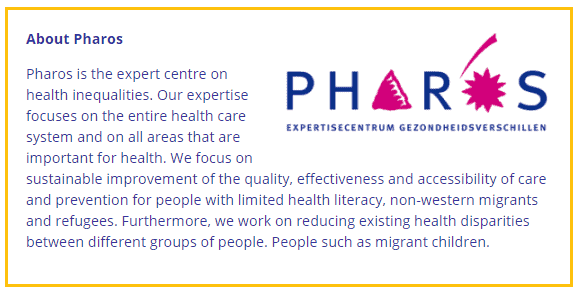To help migrant children to thrive in new environments Pharos is delivering support to careers and teachers. Their efforts aim to both support children’s development, and to reduce inequalities.
By Anna de Haan and Karin Egelmeer

Why focus on wellbeing in school?
Wellbeing is an important condition for pupils to be able to function and learn in an optimal manner. Working on social and emotional skills in school is of great importance to support wellbeing. These skills help children to develop competencies such as creativity, empathy and adaptability- essential skills in our fast-paced and complex society2.
Focusing on wellbeing is especially important for migrant children who are more likely to have experienced trauma. Moreover, they may experience poverty3 or language deficiency- these are important issues for children to be aware of. Teachers should pay attention to these matters and can play an important role in making children and their parents feel at home4. It is important that they work on resilience, safety and connection with these children and their families. Even when children do not speak the language, teachers can offer safety, structure, and a safe haven where children can express themselves. For parents, teachers can be a trusted third party. When parents and teachers establish a warm, trusting bond, they can contact each other in case there are any questions or issues.
Structural attention on wellbeing in school leads to various positive health outcomes5;
- Pupils feel connected to the school.
- Pupils experience less psychological health problems such as depression, fear and anxiety.
- The chances of pupils portraying risk behaviour such as tantrums, violence, alcohol and drug abuse diminish.
Practical steps to progress
It is important to provide support to parents, teachers, and healthcare professionals. Schools in deprived neighbourhoods and attended by migrant children need particular support. Pharos is delivering this. It offers information and advice to schools, but also to other important stakeholders such municipalities.
Additionally, Pharos offers;
- Information and training on working in a culturally sensitive manner. We, for instance, offer a report on working with youth and families in a culturally sensitive manner. We also offer materials on this matter for (para)medical education and a training for healthcare professionals in palliative care.
- We support cultural mediators, who are usually a part of certain (migrant) communities. Therefore, they can advise and support parents conforming to their own culture;
- We support parents in child-rearing by offering resources and expertise to (a.o.) volunteers, coordinators, coaches or buddies. For example, we offer an e-learning module about child-rearing support to refugee families..
- We have made available two educational methods which teachers can use to work on the wellbeing of (migrant) children. These methods are called “World Travelers” (primary education) and “Welcome to School” (secondary education).
- We offer information materials, training and advice to healthcare, education and municipal professionals to support migrant families in an optimal way. We do this by developing factsheets, methods, publications and information materials. We, for instance, have two factsheets on child-rearing support to non-western migrants and refugee families, and accessible child-rearing support on handling media.
- And much more.
Do you want to know more about Pharos and our work with migrant children and their families? Feel free to contact Anna de Haan, senior advisor and project leader migrant and refugee youth.
References
[1] Every child who has migrated to the Netherlands – with or without being exposed to war.
[2] Zonderop, Y. 09-05-2019. Het onderwijs dreigt zijn doel en relevantie te verliezen. Interview met OESO directeur Andreas Schleicher. De groene Amsterdammer,.
[3] Migrant children are more likely to grow up in deprived neighborhoods in the host country. 93% of the children living in deprived neighborhoods has problems in school. In average neighborhoods, 59% has these problems. (Ongelijke kansen in het onderwijs. ABN AMRO Foundation Seminar 2019).
[4] Tuk, B., Vlietstra, I. 2017. Wereldreizigers. Methode sociaal-emotionele ontwikkeling voor nieuwkomers op de basisschool. Pharos.
[5] Weare, K. 2015. What works in promoting social and emotional well-being and responding to mental health problems in school? Partnership for well-being and Mental Health in Schools.


